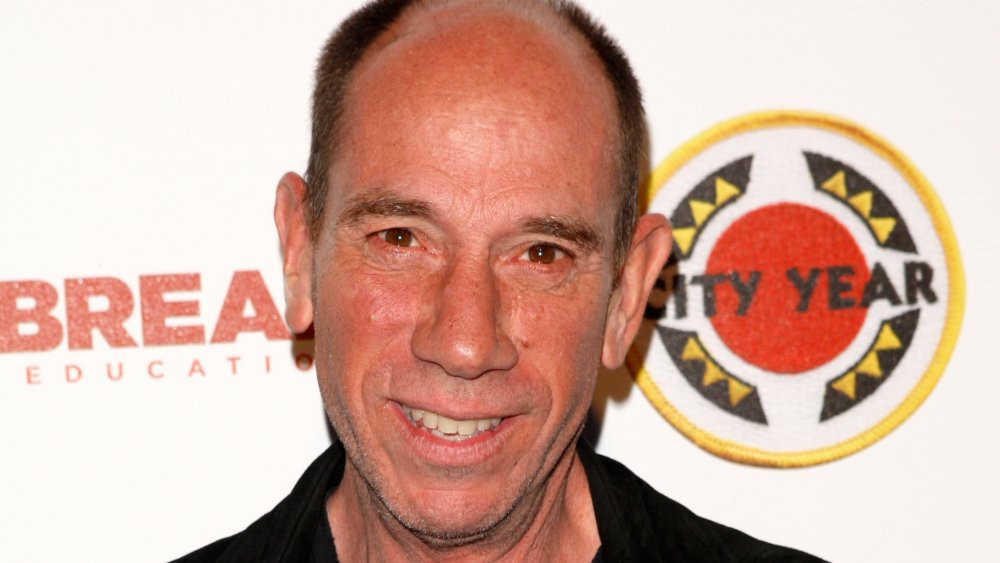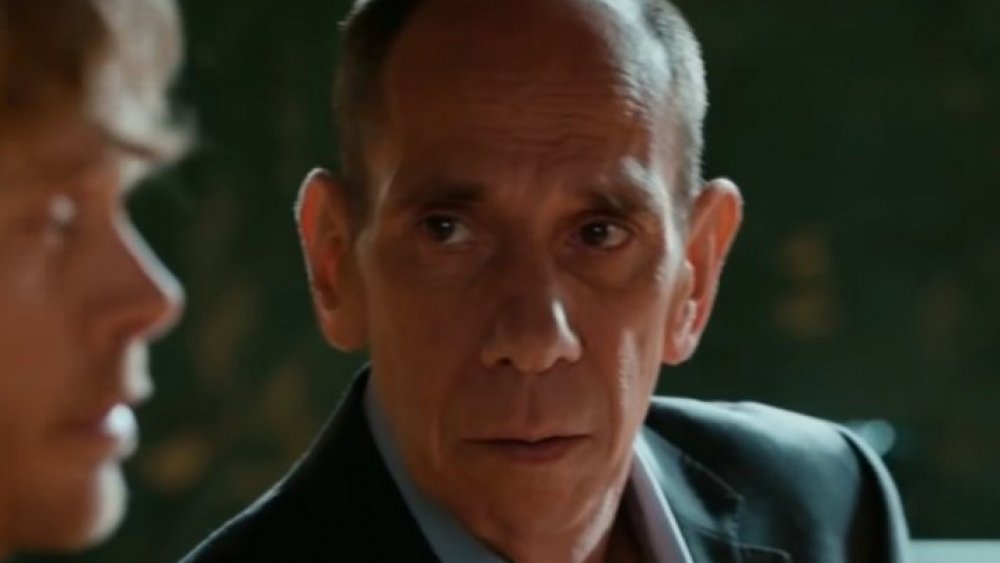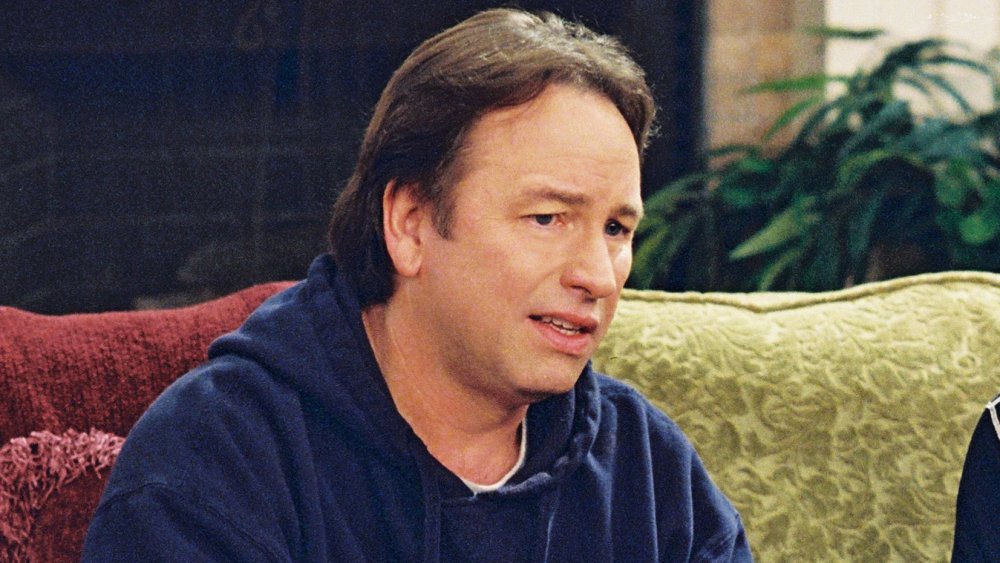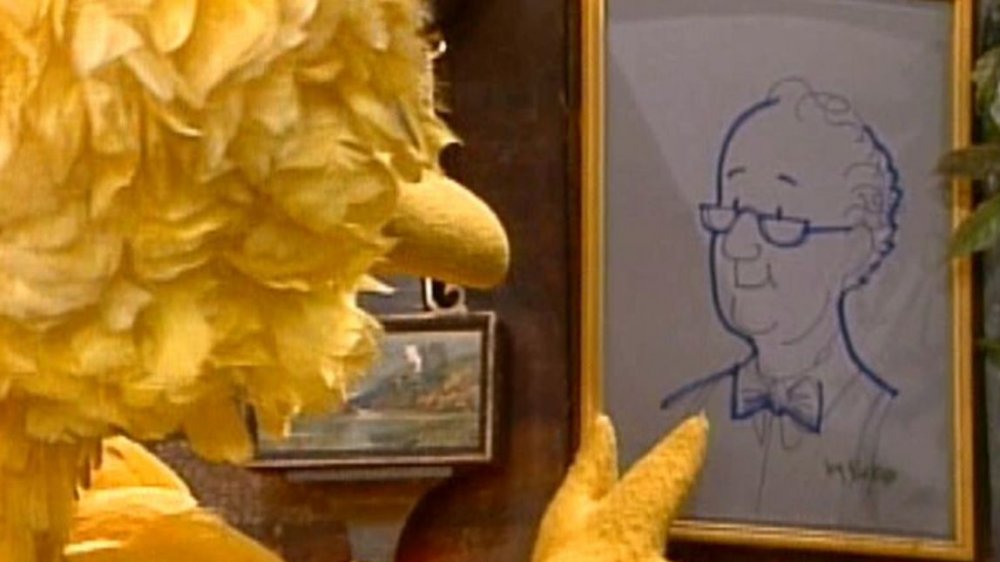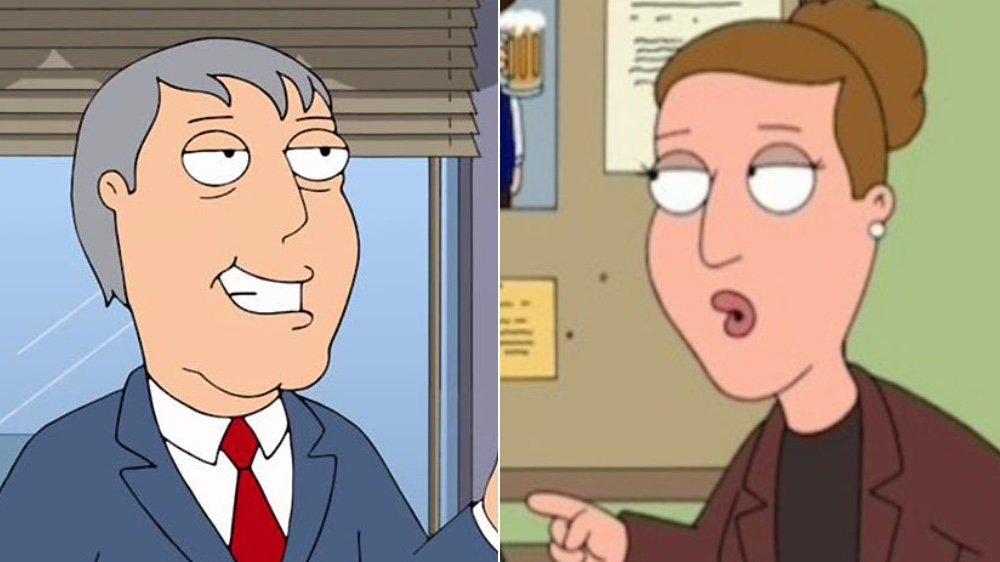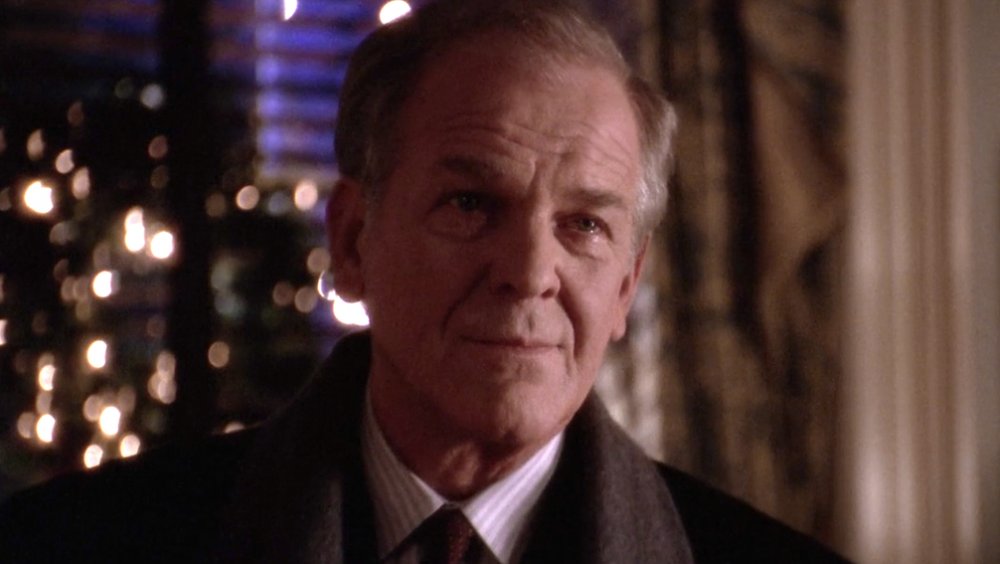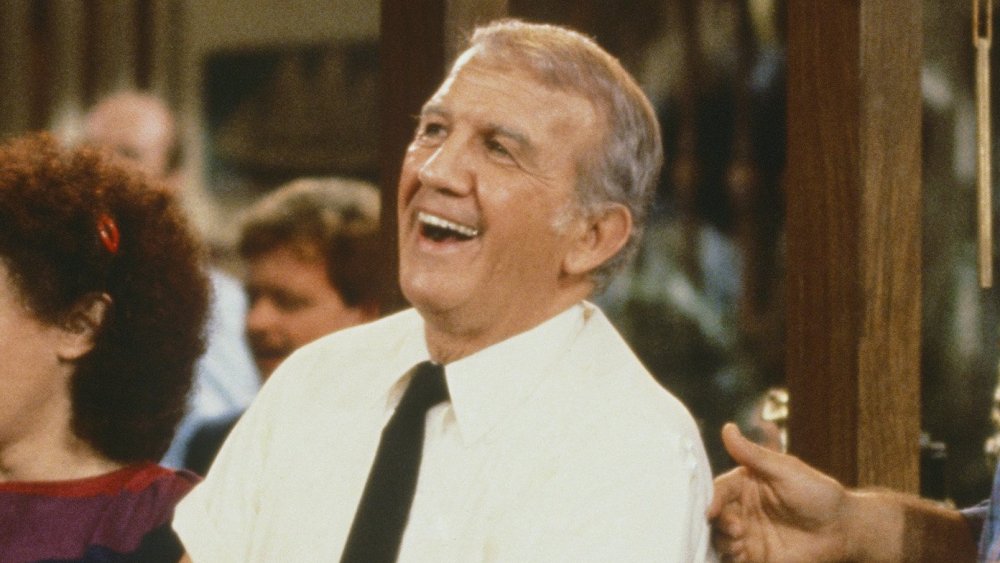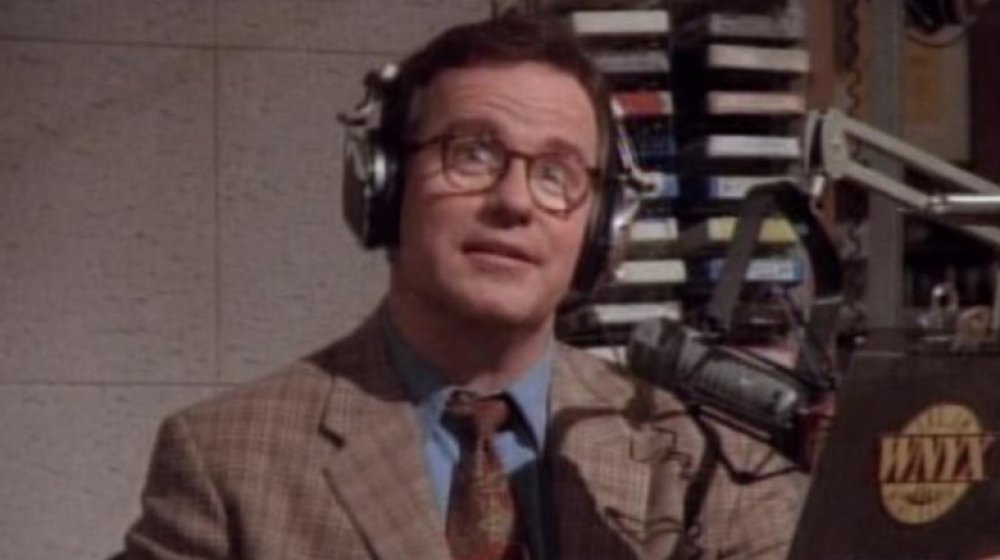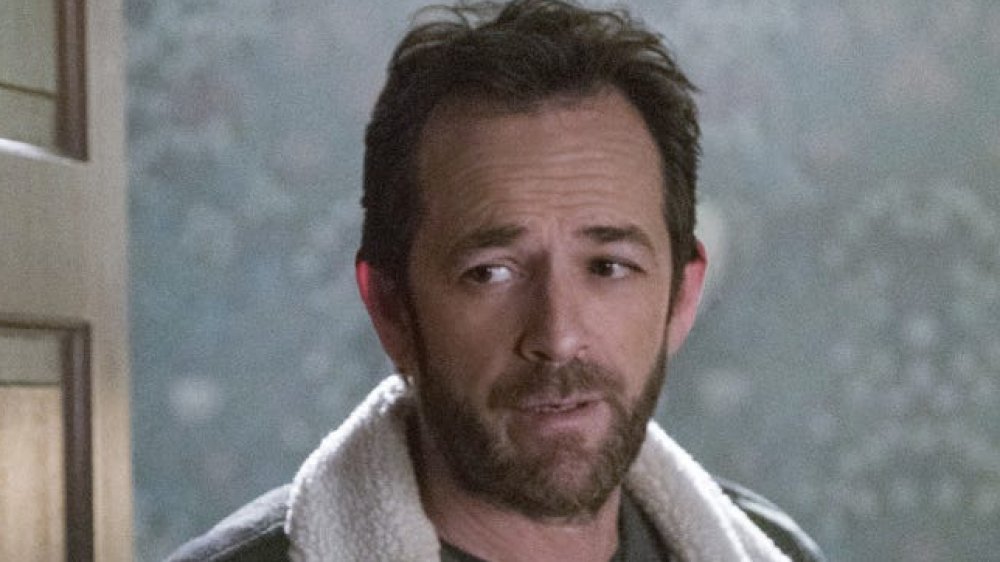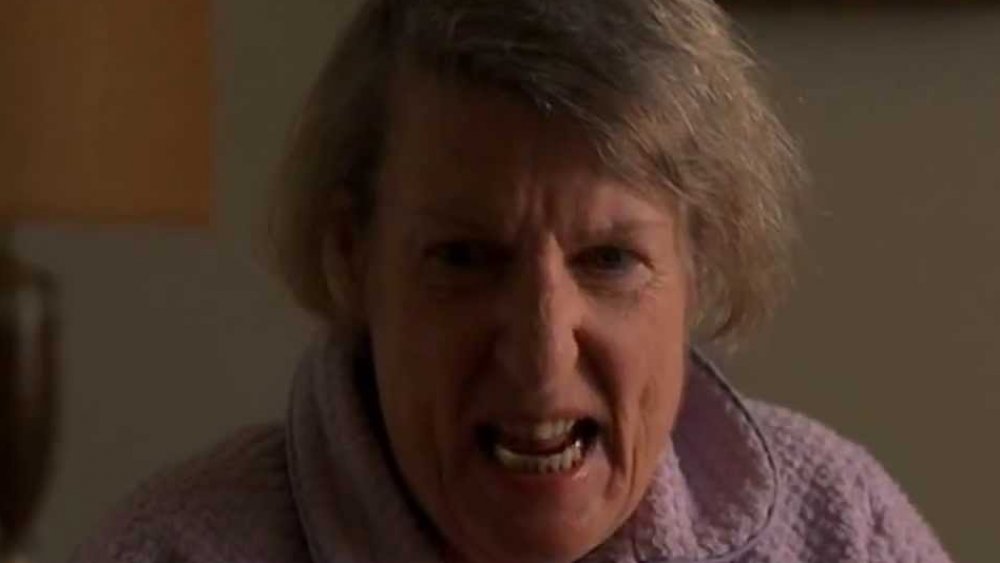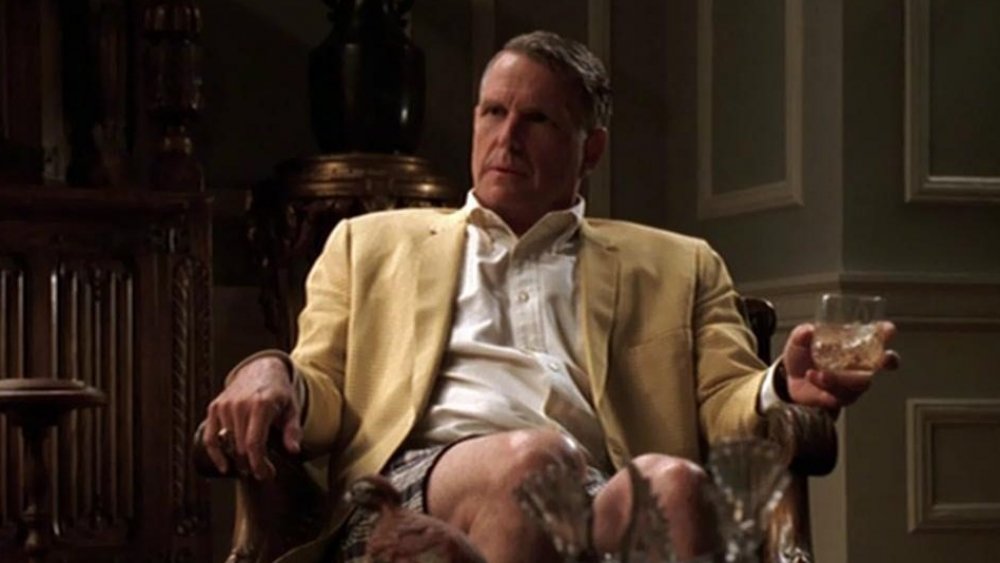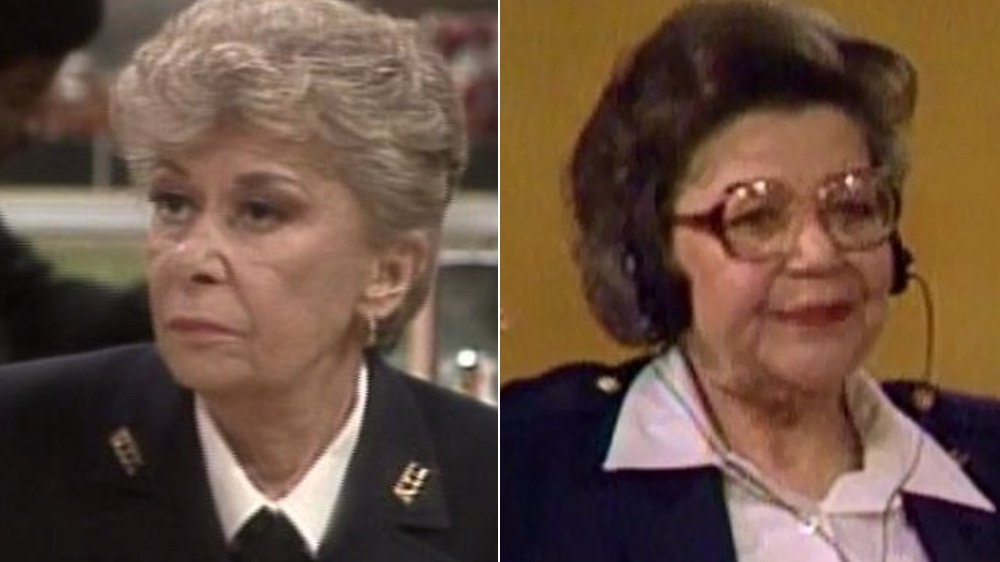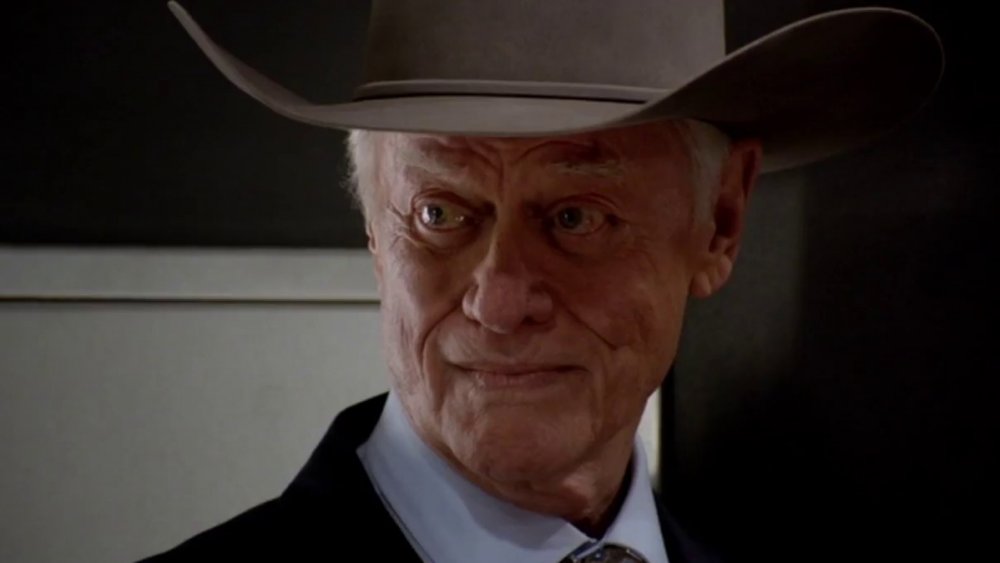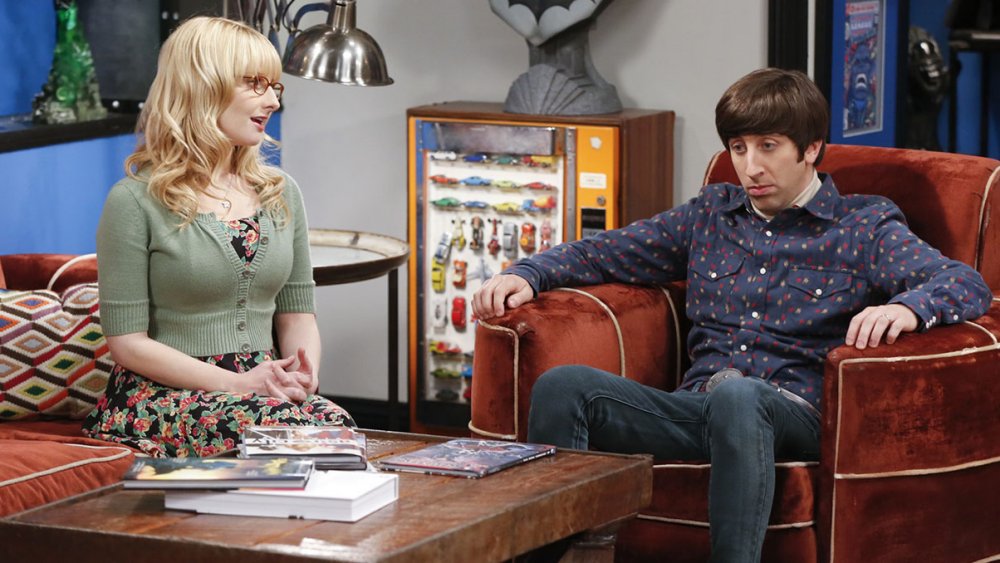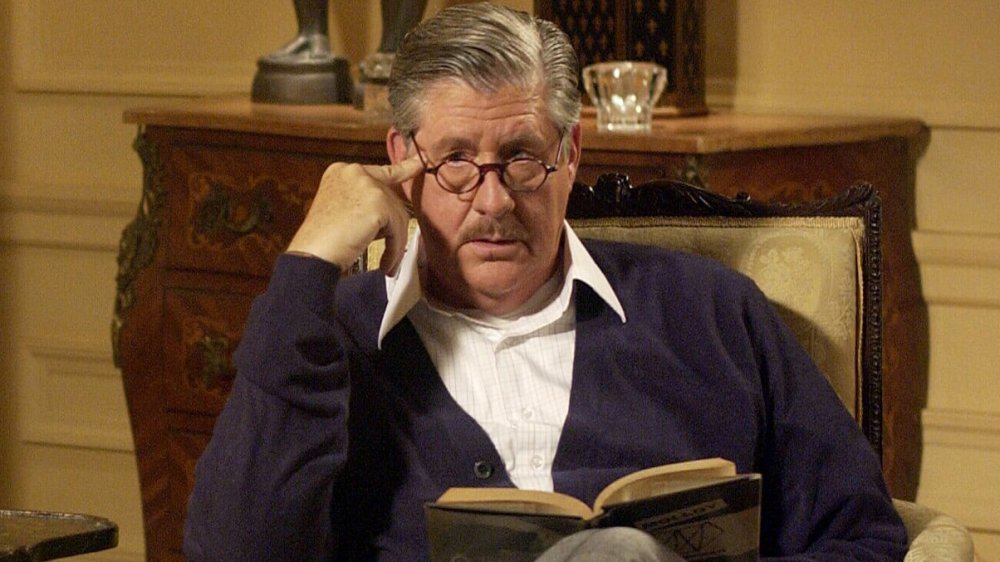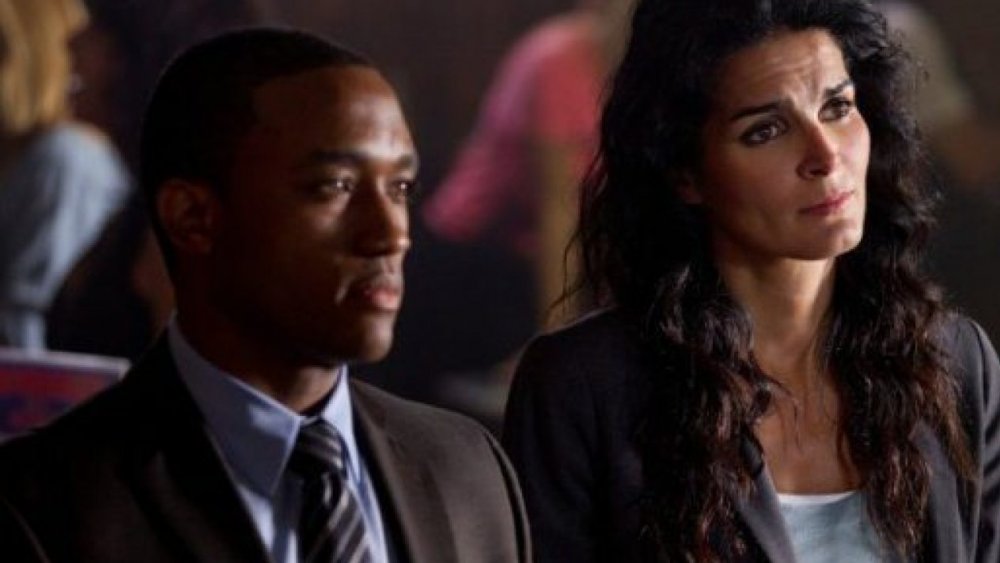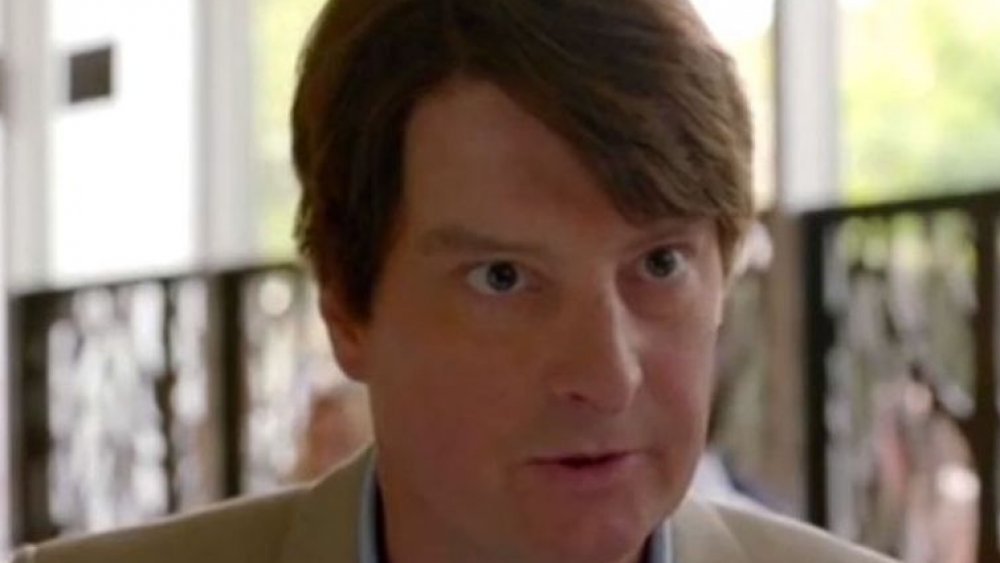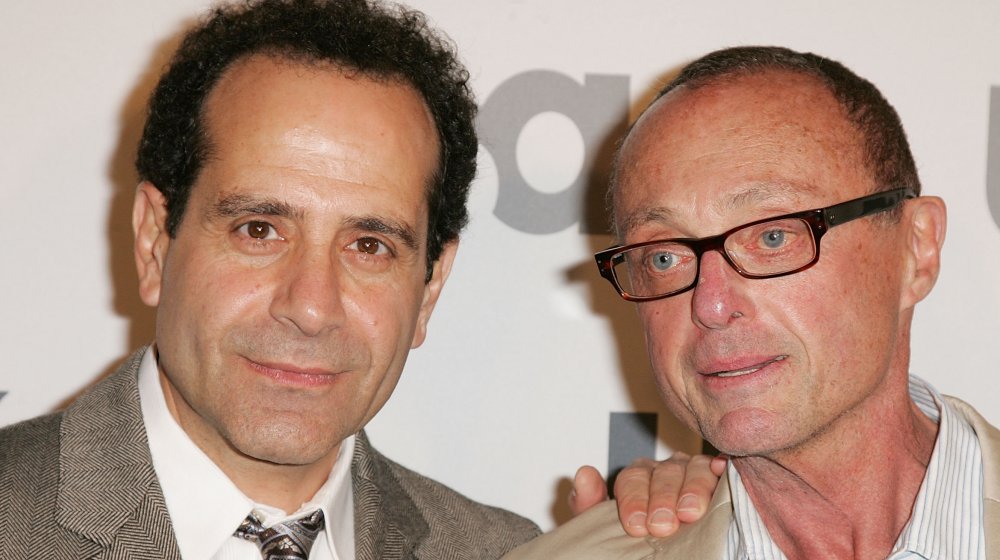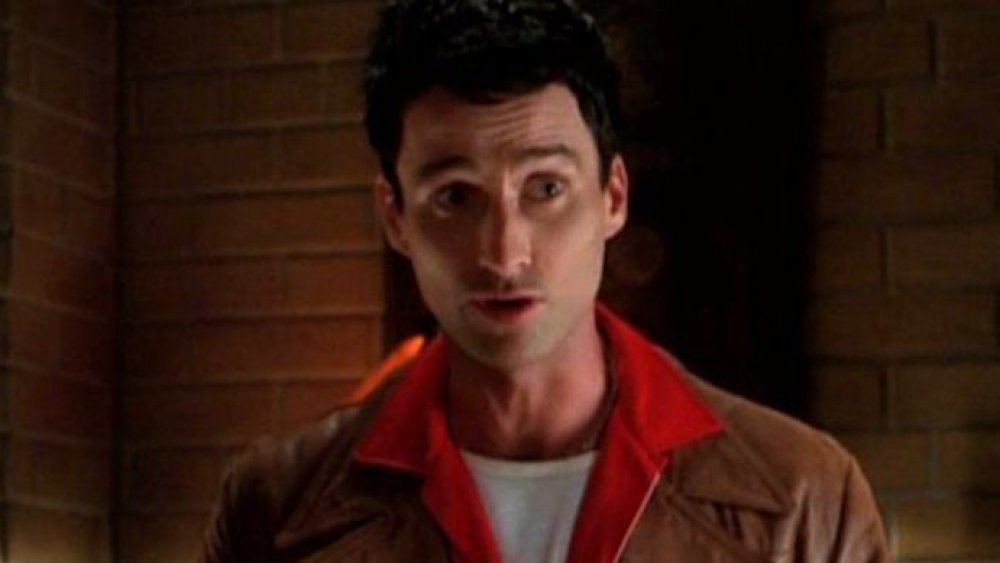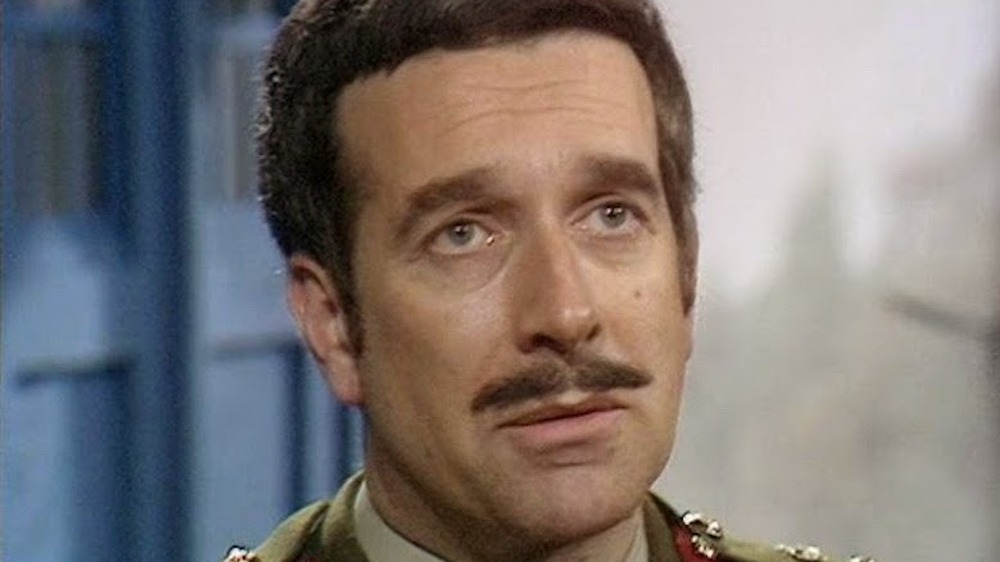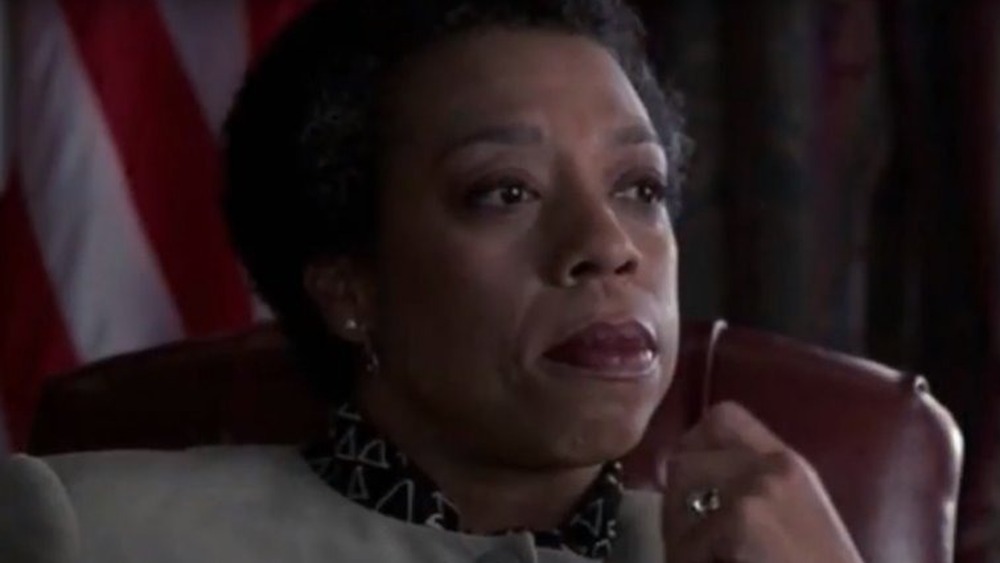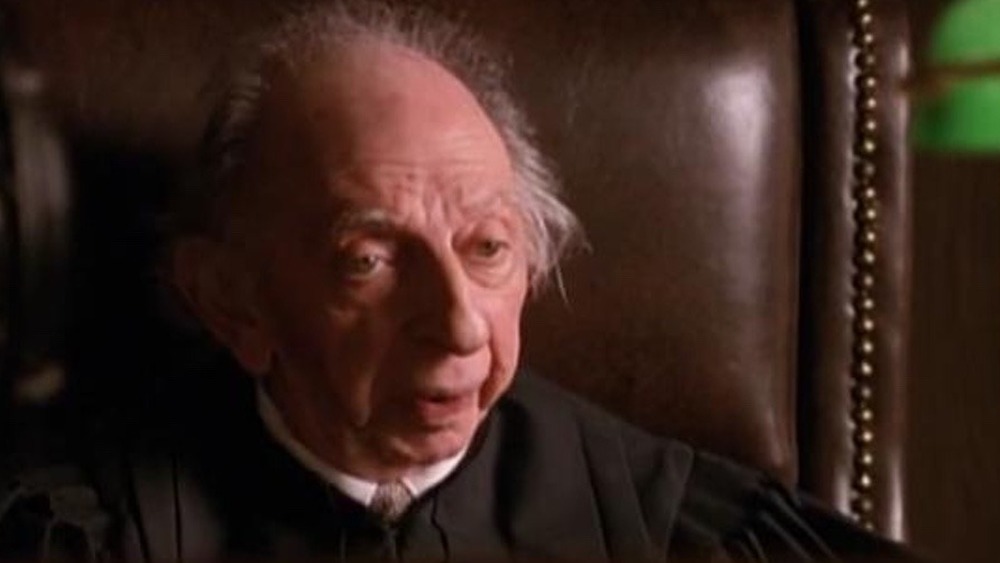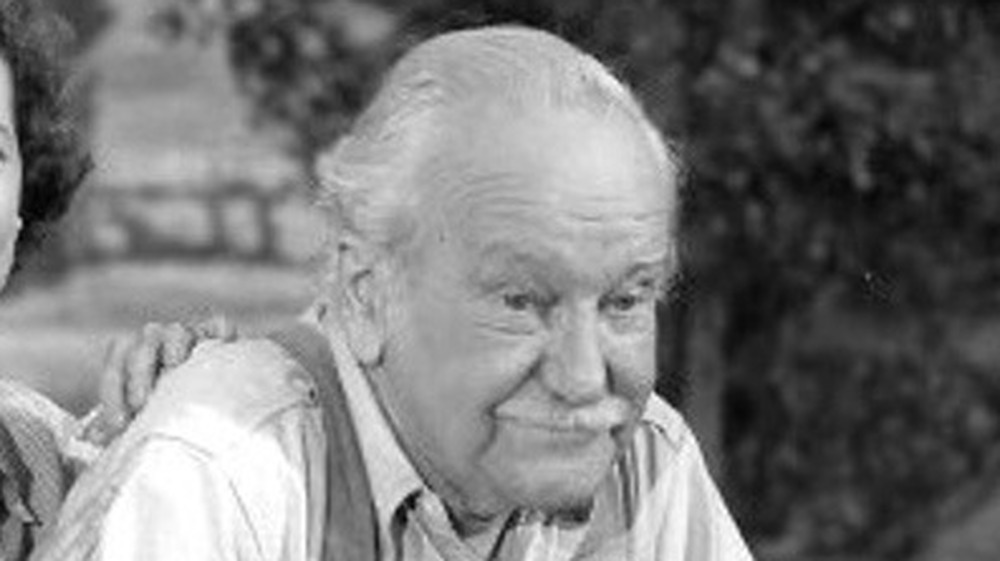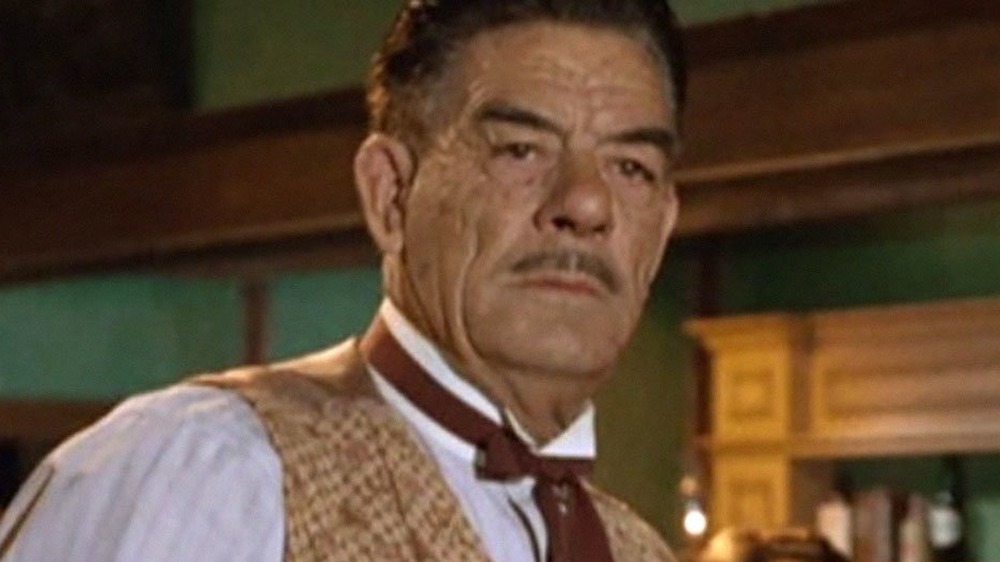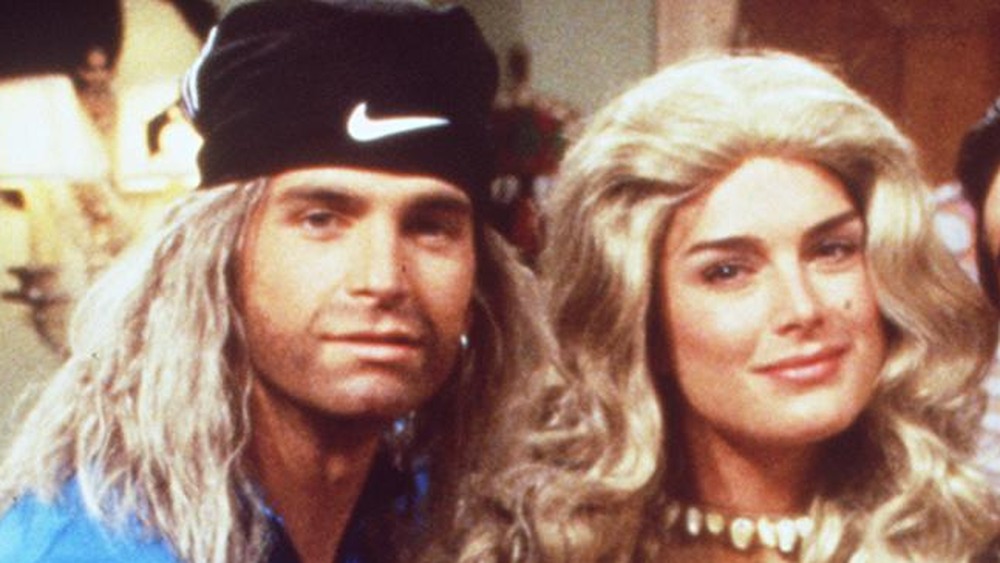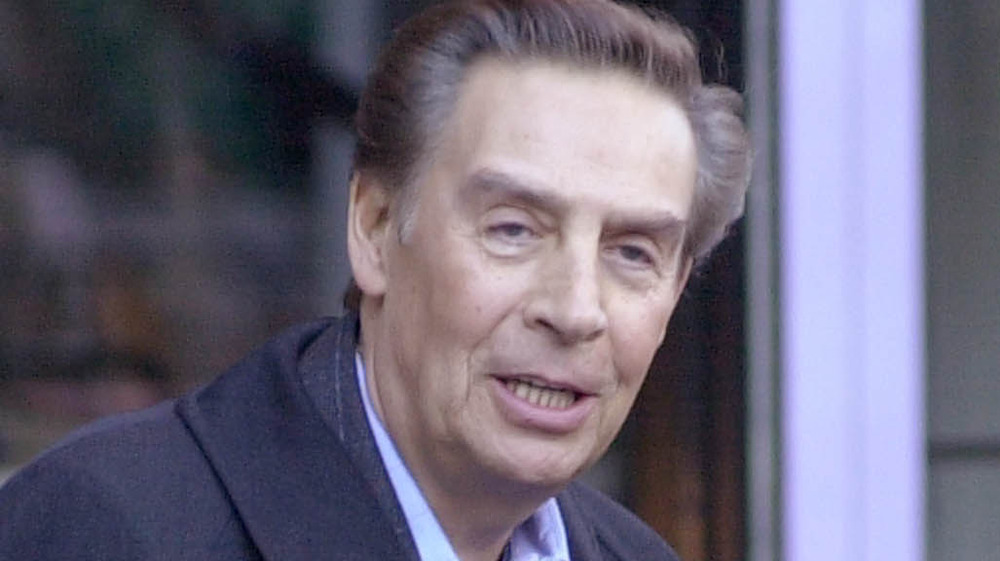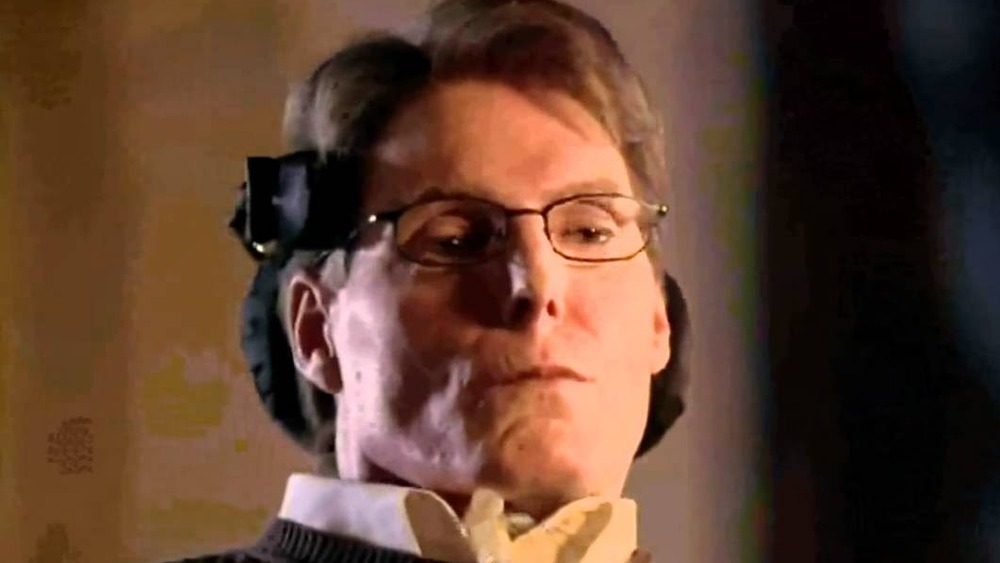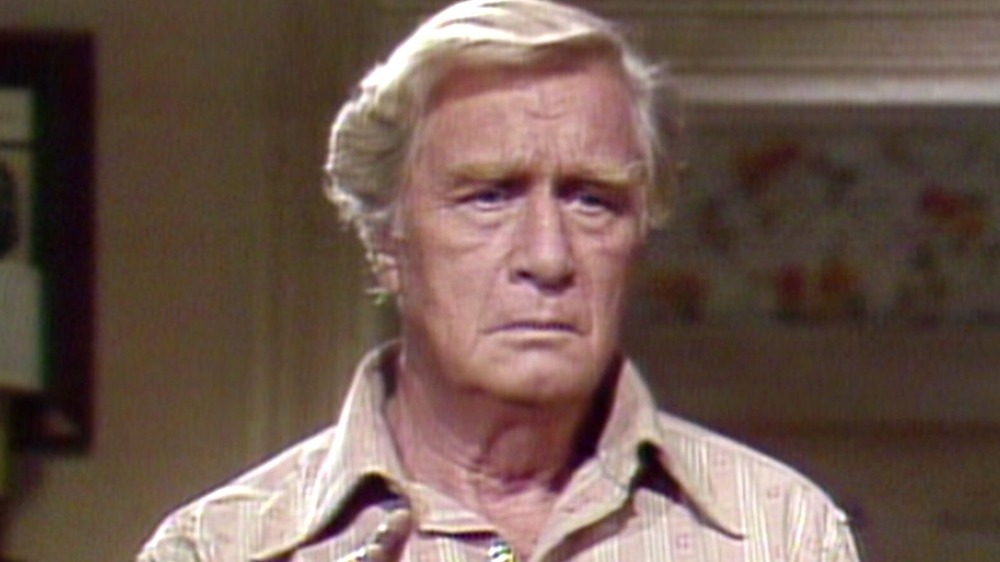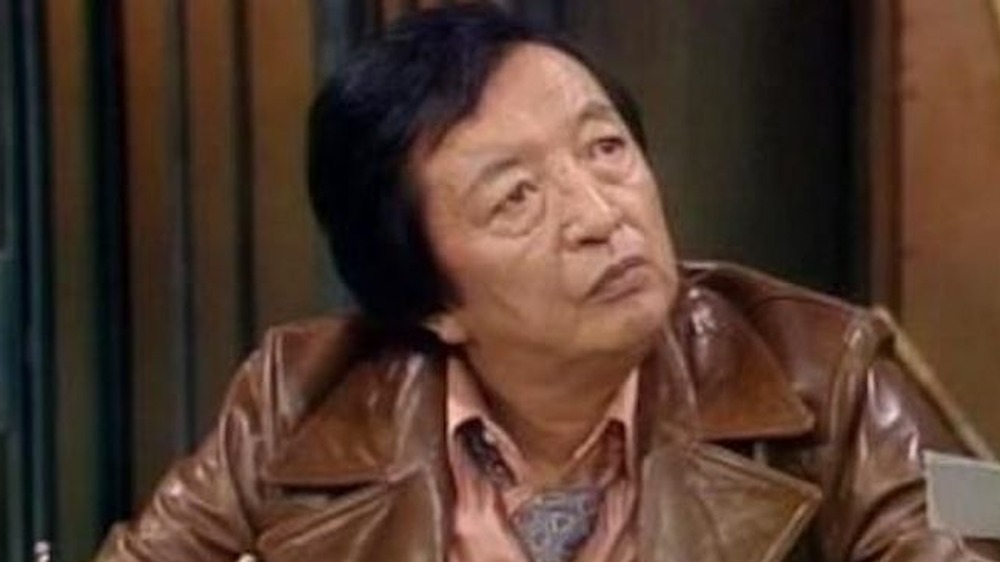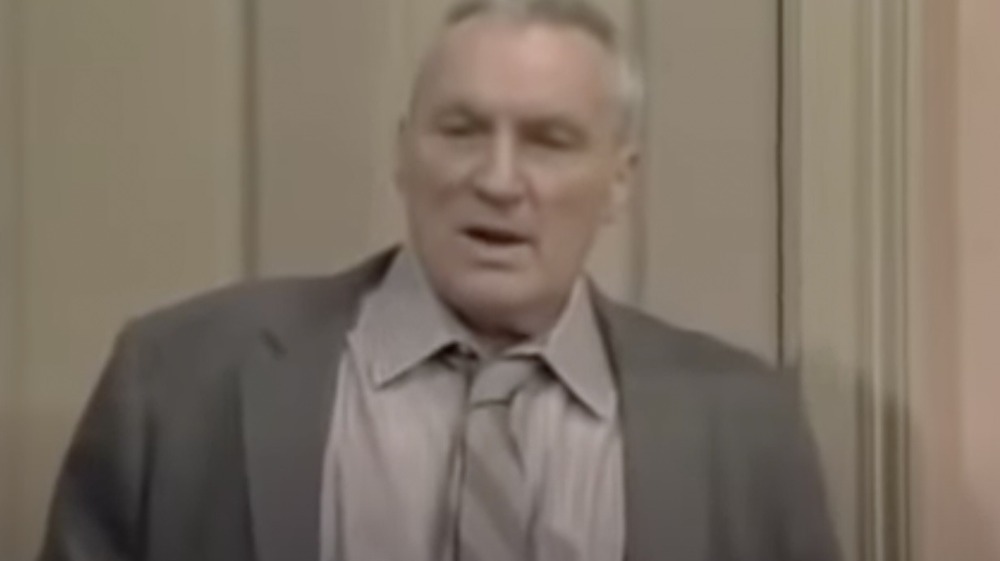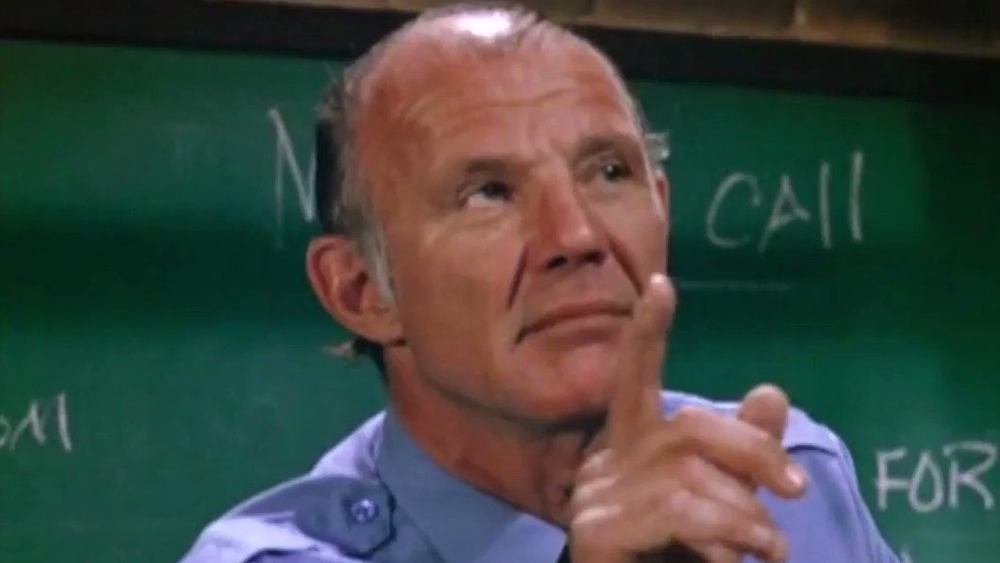TV Deaths That Happened Because The Actor Died In Real Life
Unlike a lot of industries, television doesn't have a mandatory retirement age. Actors can keep on working for as long as they are able, even as old age, health problems, and other infirmities set in. Some performers continue to work up until the very end of life. But that group doesn't just include those actors who are long in the tooth or suffering from a lengthy illness – death sometimes arrives unexpectedly. Actors perish after decades of work, at the peak of their powers, and at the beginning of what should have been long careers. That's life — or, in this case, death.
For television, an actor's death presents a variety of problems. Writers face a difficult choice: Should they recast, or end the actor's role prematurely? On the one hand, the latter choice cuts a storyline off at an abrupt point, ruining whatever plans were in place. On the other hand, the former choice introduces issues of its own: Often enough, the deceased actor was just too vital, beloved, and/or singular to be recast. Here are some times when the deaths of actors meant the deaths of their TV characters, for better or for worse.
A.D. Owen Granger on NCIS: Los Angeles
Miguel Ferrer was part of an accomplished show business family: He was the son of Oscar-winning actor José Ferrer and '50s pop singer Rosemary Clooney, as well as a cousin of superstar George Clooney. A prolific actor, he joined the cast of CBS's NCIS: Los Angeles in 2012 to play Owen Granger, assistant director of the NCIS and overseer of the Office of Special Projects in the L.A. branch. Ostensibly arriving to hunt down a killer, he's really there to keep an eye on (and hassle) the show's regular squad and bring his secrecy-shrouded experience as a CIA officer to the table.
In a 2016 episode, A.D. Granger tells his colleagues that he's dying from a form of cancer, possibly related to exposure to Agent Orange during his time carrying out government missions in Southeast Asia. He evades death at the hands of his enemies twice, once via a stabbing and again when an assassin tries to taint his IV drip with poison. Granger then disappears, absconding from his hospital bed and presumably dying from terminal cancer offscreen. By the time Granger's storyline was wrapped in 2017, Ferrer had died too. Like his character, Ferrer suffered from cancer, and passed away at age 61.
Paul Hennessy on 8 Simple Rules
After a few years plying his trade as a film actor, John Ritter returned to television in 2002's 8 Simple Rules for Dating My Teenage Daughter. The medium had always been good to him: He won an Emmy for his work on Three's Company, and starred for three years on the '90s CBS rom-com Hearts Afire. In 8 Simple Rules, Ritter played befuddled family man Paul Hennessy, who is deeply anxious about his kids aging into rebellious, independent teens. Ritter had only filmed one full season of the ABC sitcom when he fell ill on set in September 2003, complaining of nausea, weakness, and chest pain. Later that day, 54-year-old Ritter died of an undiagnosed heart ailment called an aortic dissection.
After a brief hiatus, 8 Simple Rules returned to television, necessarily revamped due to the loss of its star. The two-part episode "Goodbye" reveals that Paul died after collapsing at the grocery store. In subsequent episodes, James Garner and David Spade join the cast as Grandpa Jim and nephew C.J., respectively, who move in to help the widowed Cate Hennessy (Katey Sagal) raise her three kids.
Mr. Hooper on Sesame Street
Will Lee was a regular presence on Sesame Street from the beginning, portraying Mr. Hooper, the kindly proprietor of Hooper's Store. Big Bird absolutely adores the sweet old man, and not just because he mixes up a mean birdseed milkshake. Lee made public appearances as Mr. Hooper and recorded segments for Sesame Street up until November 1982. One month later, Lee died of a heart attack in New York City's Lenox Hill Hospital at the age of 74.
A survey conducted shortly before his death found that Mr. Hooper was the most recognized human adult on Sesame Street. In the wake of his death, Sesame Street producers were left with the monumental task of having to explain the death of Mr. Hooper — and the concept of death in general — to an audience of extremely young and emotionally vulnerable children. The series ultimately decided to tackle the death head-on, with the help of some consulting child psychologists. Airing on Thanksgiving Day 1983, the absolutely heartbreaking episode finds the childlike Big Bird unable to locate Mr. Hooper, and the adults on Sesame Street gently explaining to him that the old shopkeeper has died, and that death is final. As Big Bird learns, it's okay to be sad about loss — but also, that Mr. Hooper will live forever in the memories of all who loved him.
Mayor Adam West and Angela on Family Guy
As an animated series, adhering to the rules of reality isn't usually much of a concern to the makers of Family Guy. However, when the highly recognizable actors behind certain recurring roles pass away, the show usually retires their characters by having them die, following it up with an uncharacteristically sweet and sentimental on-air tribute.
Carrie Fisher — forever Princess Leia in the Star Wars movies — appeared often on Family Guy as Peter Griffin's lascivious boss, Angela. Fisher died in 2016, and the show paid homage two years later, with Peter (Seth McFarlane) delivering a graveside eulogy at Angela's rainy day funeral. Peter calls her "fearless, spontaneous, honest about herself just as much as she was about the world around her," obviously referring more to the actor than her character.
2017 brought another major death to the show's door with the passing of Adam West. The man best known for playing Batman had become nearly as beloved for his portrayal of Mayor Adam West, a bizarre version of himself who rules over Family Guy's Quahog. In the 2019 episode "Adam West High," the mayor's passing is commemorated when the town decides to rename the local high school after him. Later on, he appears in the form of a spirit and saves Brian from dying in a bus accident.
Mrs. Krabappel on The Simpsons
It is arguably easier for an animated series to handle the death of a cast member. As the performer's image is not used, producers can get a new, soundalike actor to take over a role vacated by a death. Case in point, Grey DeLisle-Griffin became the new Martin Prince on The Simpsons after the death of original actor Russi Taylor in 2019. Writers weren't interested in killing off a child character — but that's not the direction they took when Marcia Wallace died in October 2013. Previously best known for portraying receptionist Carol on The Bob Newhart Show, Wallace used her distinctive voice to play Bart Simpson's sarcastic and long-suffering fourth grade teacher Mrs. Krabappel for well over 20 years.
Wallace simply wasn't replaceable, and so her character was retired. About a week after the 70-year-old passed away, The Simpsons paid tribute in an episode's opening credits: Bart's chalkboard message that week reads, "We'll really miss you, Mrs. K." A March 2014 episode includes an epilogue in which Krabappel's husband, Ned Flanders, daydreams about their good times together, and is joined in his mourning by one of her students, Nelson Muntz.
Leo McGarry on The West Wing
John Spencer worked extensively from the 1960s on, frequently playing tough and world-weary cops, lawyers, soldiers, and sundry other authority figures. They all prepared him for his signature role, that of recovering alcoholic and Secretary of Labor-turned-White House Chief of Staff Leo McGarry on NBC's behind-the-scenes political saga, The West Wing. Spencer earned five Emmy nominations for this role, an advisor and close friend to Martin Sheen's President Bartlet, finally winning the prize in 2002.
In the show's seventh and final season, McGarry is picked to be the vice presidential candidate on the ticket of presidential candidate Matt Santos (Jimmy Smits). The duo wins the election, although McGarry doesn't live to see it — he dies of a heart attack in his hotel room on election night, just before the polls close. This sad twist was necessitated by the death of Spencer, who suffered a fatal heart attack a few days before his 59th birthday in December 2005.
Coach on Cheers
Nicholas Colasanto worked extensively in television in the 1960s and 1970s, both as an actor and as a director. In 1982, he started work on Cheers, portraying Ernie Pantusso, the easy-going bartender who'd once coached bar owner Sam Malone in his baseball days. Coach became Colasanto's most recognizable role — a truly impressive feat, given the breadth of his career.
When he was cast on Cheers, Colasanto was well into his 50s and already suffering from heart problems. His health took a turn for the worse in late 1984: Following a hospitalization for water in his lungs, he couldn't get medical clearance to return to the rigors of shooting Cheers. In February 1985, the 61-year-old actor died of a heart attack. A few months later, Woody Harrelson joined the cast as Cheers' new bartender, Woody Boyd, following a brief explanation of Coach's passing. Coach is mentioned sporadically throughout the rest of the show's run.
Bill McNeal on NewsRadio
Phil Hartman dominated Saturday Night Live during his nine-year stint on the show with characters like Unfrozen Caveman Lawyer, Frankenstein, and a particularly smarmy take on Bill Clinton. He then moved on to another sharp ensemble show: NBC's workplace sitcom, NewsRadio. Hartman played Bill McNeal, an obnoxious, rude, self-absorbed newsreader for New York City radio station WNYX. He portrayed the part with relish from 1995 to 1998, making his final appearance in the Titanic-themed fourth season finale.
In May 1998, before the fifth season of NewsRadio went into production, Hartman's troubled marriage to wife Brynn Omdahl ended in unspeakable tragedy. According to the Los Angeles Times, the troubled model and actress shot a sleeping Hartman to death and then took her own life. Hartman was 49. NewsRadio's fifth season, which aired the following fall, begins with "Bill Moves On," in which the WNYX team heads to the office after the funeral of Bill McNeal, said to have died from a heart attack. Most of the episode consists of the other characters talking about Bill and openly crying — tears that might well have been real, and meant for Hartman.
Fred Andrews on Riverdale
Riverdale is the place where multiple generations of iconic teen entertainment converge. Based on the classic Archie Comics stable of characters, the CW series deposits Archie, Betty, Veronica, Jughead, and the rest of the gang in a dreary, foggy, Twin Peaks-like town absolutely rife with dark doings. Many of the grown-ups are played by teen idols of yore, including '80s Brat Packer Molly Ringwald as Archie's mother and Luke Perry, the brooding, side-burned Dylan McKay from Beverly Hills, 90210 as Archie's wise and doting father, Fred Andrews.
Riverdale's first season ends in a cliffhanger, in which Fred is shot by a masked assailant. He survives, but in the first episode of season four, Archie finds out that his father has unexpectedly been killed by a hit-and-run-driver after he stopped to help a stranded motorist played by Perry's 90210 love interest, Shannen Doherty. That abrupt choice came about due to the tragic real-life death of the actor. In February 2019, Perry suffered a severe stroke at the age of 52 and was immediately hospitalized and placed in a medically induced coma. He died a few days later.
Livia Soprano on The Sopranos
The Sopranos blew audiences away with its thoughtful exploration of what makes a man turn to a life of violent crime. Tony Soprano (James Gandolfini) is a complicated guy: He's a mob boss and a family man, who has his rivals killed but then needs to discuss it with his therapist. The Sopranos suggests that a lot of Tony's anguish and emotional pain stems from his mother, Livia, a manipulative, self-serving, conspiratorial abuser.
Nancy Marchand played the character with a fascinating, chilling intensity. A four-time Emmy winner for her work on newspaper drama Lou Grant, Marchand added two more nominations to her resume for portraying Livia. The second, however, came posthumously. in June 2000, 71-year-old Marchand died of cancer and chronic pulmonary disease. The Sopranos' third season hit HBO in early 2001, and in the episode "Proshai, Livushka," it's revealed that Livia Soprano died in her sleep, having suffered a stroke.
Andrew Campbell on Mad Men
Andrew Campbell wasn't a main character on Mad Men, but he was an influential one — the stern, aloof, and disapproving father of slimy young advertising executive Pete Campbell (Vincent Kartheiser) made quite the mark on his son's psyche. He appears in just one first season episode, 2007's "New Amsterdam," and could have eventually made some return appearances if not for the tragic and unexpected death of his actor, Christopher Allport. In January 2008, Allport was killed by an avalanche while skiing in California's San Gabriel Mountains. In the second season episode, "Flight 1," employees at the Sterling Cooper ad agency listen to radio news reports about an American Airlines flight that crashed shortly after taking off from New York City. That is, in fact, an actual tragedy that occurred in March 1962 – another testament to the '60s-set show's commitment to historical accuracy. Later in the episode, Pete learns that his father was on the flight, and that he didn't survive.
The two bailiffs on Night Court
It's a sad and shocking event when an actor appearing on an in-production TV show passes away, but it's downright unheard of for the same fate to affect a series twice. Yet that's what happened to Night Court. The sharp, adult-oriented NBC sitcom premiered in January 1984, and among its motley crew of overnight courtroom staff was veteran actress Selma Diamond as elderly, wisecracking bailiff Selma Hacker. Diamond only appeared in 36 episodes of the show's first two seasons: She died of lung cancer at age 64 in May 1985.
When the third season of Night Court debuted later that year, Selma Hacker had died offscreen, sending co-bailiff Bull Shannon on a drunken bender. Order is restored with the arrival of Selma's replacement, Florence Kleiner. Florence Halop played the character, who was very similar to the previous bailiff. Tragically, after just 22 Night Court episodes, 63-year-old Halop died too, also of cancer. In the fall of 1986, Marsha Warfield joined Night Court as its third and final female bailiff, Roz Russell. Thankfully, Warfield survived the show, and performs to this day.
J.R. Ewing on Dallas
Larry Hagman played one of the most famous TV characters of all time, but not one of the most beloved: Hagman portrayed a legendary villain. From 1978 to 1991, he starred as backstabbing oil magnate J.R. Ewing on Dallas. The Texas tycoon behaves so badly that somebody was bound to take a shot at him, and in 1980, somebody finally did. The second season of Dallas ends on a cliffhanger, when an unidentified attacker guns down J.R., leaving millions of viewers to wonder if the character would survive. He did survive the shooting, which came courtesy of Kristin Shepard, his sister-in-law and ex-mistress. J.R. Ewing survives another brush with death in the final episode of Dallas, which aired in 1991, when a ghost convinces the wicked man to kill himself. Whether J.R. lives or dies isn't explicitly revealed, but modern fans can assume he survived, as he's a main character in TNT's 2012 Dallas continuation.
Shortly after the 2012 show's first season aired, Hagman died in November 2012 at the age of 81, after a fight against cancer. Dallas decided to have J.R. Ewing die, too, and writers revived the "Who Shot J.R.?" slogan to do it. In a 2013 episode, an unidentified person puts a bullet in the industrialist, later revealed to be a setup by J.R. himself, to arrange one more tricky business deal while he dealt with terminal cancer.
Finn Hudson on Glee
Portraying dim but sweet jock-turned-chorus member Finn Hudson on Fox's musical dramedy Glee was a breakthrough role for Canadian actor Cory Monteith. The likable star anchored the popular teen show for four seasons, all the while quietly struggling with a powerful drug addiction. His mother, Ann McGregor, told ABC News that Monteith started using drugs at 15, and struggled with substance addiction off and on for the next decade and a half. In July 2013, the body of the 31-year-old actor was found in his Vancouver hotel room. He had died of a fatal overdose of heroin and alcohol.
In October 2013, Glee aired an episode entitled "The Quarterback," in which Finn's friends, fellow club members, family, and teachers all agonizingly mourn the deceased teenager. The series noticeably refuses to discuss how Finn died. "What can you say about a 19-year-old who dies?" his stepbrother, Kurt (Chris Colfer) says. "Everyone wants to talk about how he died, but who cares? It's one moment in his whole life." Finn is remembered frequently through the rest of the show's run.
Mrs. Wolowitz on The Big Bang Theory
Apart from the occasional shot of an arm, or a glimpse of her from across a vast distance, Mrs. Wolowitz was never actually seen on The Big Bang Theory. In the tradition of Vera from Cheers or Maris from Frasier, Mrs. Wolowitz's appearance exists only in the minds of viewers. This makes sense, as producers likely would've had a tough time finding an actor who fit the description laid out in numerous bits of dialogue, which imply she is an impossibly large person. Instead, Carol Ann Susi provided a voice for the character — an extremely loud and exaggerated New Jersey accent — heard when yelling at her son, Howard (Simon Helberg), from around the house they shared. Susi, who'd amassed dozens of acting credits, died of cancer in November 2014 at the age of 62. A few months later, in the 2015 episode "The Comic Book Store Regeneration," The Big Bang Theory's writers said goodbye to Mrs. Wolowitz. While visiting her sister, Gladys, in Florida, she passes away in her sleep.
Richard Gilmore on Gilmore Girls
Each and every episode of the warm, crackling, low-key dramedy Gilmore Girls features an odd credit: "Special appearance by Edward Hermann." The actor appeared in a majority of episodes, so he was a regular cast member — the unique introduction spoke to his status as the best-known and most esteemed member of the Gilmore Girls ensemble. Before he portrayed the impeccably dressed, propriety-obsessed wealthy dad and grandpa Richard Gilmore, Herrmann had portrayed President Franklin Roosevelt in multiple TV projects, had been part of projects like American Playhouse and St. Elsewhere, and served as the voice of the History Channel. As the New York Times aptly put it, he had an unmistakably "noble air."
Gilmore Girls ended its original seven-season run in 2007, but returned for four made-for-Netflix movie-length episodes in 2016. In the interim, Herrmann ultimately lost a struggle with brain cancer, spending nearly a month in a New York intensive care unit before passing away in December 2014 at age 71. Accordingly, Gilmore Girls: A Year in the Life involves his character's passing. A few months before the events of the miniseries, Richard Gilmore dies of a heart attack, leaving the Gilmore women, particularly his wife Emily (Kelly Bishop), in deep grief and struggling to move on.
Detective Barry Frost on Rizzoli & Isles
Lee Thompson Young became a teen TV star by playing a teen TV star: As Jett Jackson on the Disney Channel's The Famous Jett Jackson, he portrayed a young actor struggling with fame, family, and school from 1998 to 2001. Young successfully transitioned to more adult projects, including Flashforward, Scrubs, and Smallville. The most prominent role of Young's adult life was that of Barry Frost on Rizzoli & Isles, a detective who often assists the titular duo.
On August 19, 2013, Young did not report to the Rizzoli & Isles set as expected. According to USA Today, police went to his home to see if he was alright, and discovered that the 29-year-old actor had taken his own life. The show briefly shut down production, and in June 2014, addressed the fate of Young's character. In the episode "Goodbye," Frost is revealed to have died offscreen in a car accident, and the other characters attend his memorial service.
Peter Gregory on Silicon Valley
A versatile character actor, Christopher Evan Welch appeared in many films and TV shows of the 21st century, including The Master, Lincoln, and Law & Order. But he's likely best known for what would turn out to be his final role: Inscrutable, stoned-faced, idiosyncratic venture capitalist Peter Gregory on Silicon Valley. Welch appeared in five episodes of the first season of the HBO tech world satire, courted for his cash by the main characters as they work to launch a potentially revolutionary app.
In December 2013, four months before Silicon Valley debuted, Welch died in a Los Angeles hospital at age 48, following a years-long battle with lung cancer. Silicon Valley waited until its second season premiere in 2015 to mention what happened to Peter Gregory. Richard (Thomas Middleditch) sees a news item online about the investor's sudden death, and later learns from Gregory's associate Monica (Amanda Crew) that he keeled over during a safari while trying to run from a stray hippo that wandered into his tent.
Dr. Kroger on Monk
USA's 2002 series Monk is memorable for its unique tone. It follows a detective, Adrian Monk (Tony Shalhoub), who often solves grisly crimes ... but Monk is also a comedy, with a lot of carefully and consciously kind humor derived from the title character's obsessive-compulsive disorder. Helping to strike that balance was the character of Dr. Charles Kroger, Monk's patient and helpful psychiatrist, who helps him work through his OCD and lingering grief over the death of his wife. So it was a major blow to the show when the actor who portrayed him, Stanley Kamel, passed away from a heart attack in April 2008, at age 65. The first episode of the show's seventh season, the first without Kamel, aired in July 2008 with a dedication to the actor. It's mentioned in dialogue that Dr. Kroger similarly died of a heart attack. Hector Elizondo then joined the cast as Monk's new psychiatrist, Dr. Neven Bell.
Doyle on Angel
Angel is a show about ageless beings and supernatural events, so death isn't all that final a concept for its various vampires, demons, and, yes, angels. When the Buffy the Vampire Slayer spinoff premiered in 1999, there were only three main characters, one of them being Doyle, a half-demon good guy who receives alarming visions that vampire detective Angel (David Boreanaz) uses to solve mysteries. Portraying the impish Irish rogue was Glenn Quinn, previously known for his work as Becky's ne'er-do-well husband Mark on Roseanne.
In "Hero," the ninth episode of Angel, Doyle sacrifices his own life to save Angel's, and never appears on the show again. However, frequent Angel writer and director Tim Minear really wanted to bring Doyle back. "Every once in a while I'd bring it up — but I'd get shot down," Minear told a Buffy/Angel blog in 2007. Any Doyle return was rendered impossible, however, in 2002, when Quinn died of a drug overdose at age 32. Years later, his Roseanne character was also made deceased: An episode of the 2018 reboot series mentions that Mark has died, and ends with a dedication to Quinn.
The Brigadier on Doctor Who
While the actors who played the titular Doctor on Doctor Who changed every few years, allowing the show to soldier on since the 1960s, some performers stayed with the show for long periods of time, playing the same characters through the show's various eras. Nicholas Courtney, for example, first appeared as the Brigadier on Doctor Who in 1968, alongside "Second Doctor" Patrick Troughton. Courtney returned to Doctor Who every so often, playing the Brigadier in episodes starring four different actors as the Doctor, stretching to 1989, when Doctor Who was cancelled.
In the 2005 reboot, the Brigadier was mentioned as being off in Peru, and then Courtney reprised the character in the Doctor Who spinoff The Sarah Jane Adventures. Courtney died at age 81 just before the final season of that show hit the air, but he was such a big part of the Doctor Who franchise that he was given a sendoff on the flagship series. In the 2011 episode "The Wedding of River Song," The Doctor (Matt Smith at that point) calls up the nursing home where the Brigadier had been living and learns from a staff member that the man "passed away a few months ago," and often regaled the staff with tales of his adventures with the Doctor.
Ella Farmer on The District
Lynne Thigpen starred in more than 70 films and TV shows over a career that lasted 40 years, and her most memorable and notable roles are widely varied, including the ominous D.J. and narrator of the 1979 cult classic The Warriors, District Attorney Ruby Thomas on L.A. Law, and the Chief, the in-house orders-giver on the popular '90s kids game show Where in the World Is Carmen Sandiego?
Five years after that show ended production, Thigpen joined the cast of The District, a CBS crime drama starring Craig T. Nelson as Chief Jack Mannion, a New Jersey police chief who moves to Washington, D.C. to serve as the new police commissioner. Helping Chief Mannion fight bad guys and corruption is his best friend and closest advisor Ella Farmer, a D.C. crime analyst. Thigpen portrayed Farmer from 2000 to 2003, last appearing in the third season episode "Rage." Shortly before the show wrapped production for the year, Thigpen died unexpectedly, according to the New York Times, at age 54. Production on The District was immediately halted, and when things started back up again three weeks later, cast and crew shot an installment called "Ella Mae" in which Chief Mannion learns that his dear friend has died and has to break the news to his squad.
Judge Boyle on Ally McBeal
Phil Leeds wasn't a household name or A-list star, or even a sitcom regular on the show that had to write out his death by having his character die as well. He was one of those recognizable character actors — a familiar presence from any number of projects, perhaps not immediately placeable but a welcome and professional presence nonetheless.
Leeds took a roundabout way to Hollywood. The native New Yorker worked as a peanut vendor at Yankee Stadium in the 1930s while moonlighting as a stand-up comedian before scoring small roles in Broadway shows in the 1940s and early TV shows in the 1950s. After getting blacklisted for refusing to name Communist associates in Hollywood, Leeds didn't work for a decade, but then started booking regular and frequent guest-star parts on TV. He showed up on programs like The Dick Van Dyke Show, The Patty Duke Show, The Monkees, Mannix, Kojak, Maude, Starsky and Hutch, Barney Miller, Night Court, and Matlock. One of Leeds' longest-lasting gigs was a recurring role on Ally McBeal as the grouchy, teeth-fixated, comically seasoned adjudicator Judge Dennis "Happy" Boyle.
After Leeds died of pneumonia in the summer of 1998 at age 82, Ally McBeal producers had Judge Boyle die, too, utilizing a suite of editing tricks of preexisting footage to give the character an onscreen death. They juiced up some scenes of Boyle asleep in court and made it look like he had died.
Gramps on Lassie
Lassie started its first of many TV series in 1954, with the titular heroic, super-intelligent collie saving the day for the Miller family: single mother and farmer Ellen (Jan Clayton), 11-year-old Jeff (Tommy Rettig), and Gramps (George Cleveland), Jeff's paternal grandfather. After three seasons, according to MeTV, both Clayton and Rettig wanted to leave Lassie, so producers worked up a plan to keep Lassie and send her to a new family while getting rid of the Millers, including sending Jeff off to a distant school and shipping Gramps off to a hospital to recover from a broken hip. But before any of these developments could be fully implemented, George Cleveland died of a heart attack in July 1957 at age 71.
This left producers rethinking their transition plan, and they considered having Gramps die along with the actor who played him. No kid-oriented show had ever before written in the death of a character to reflect the real-life death of their portrayer, and Lassie showrunners decided that this could be a teachable moment. Producer Robert Maxwell ordered writers to have Gramps die peacefully of old age, offscreen. To make sure the show did it in a way that was respectful and sensitive to the show's youngest viewers, he talked to a child psychologist who advised against using sleep analogies and advocated being more direct and honest, explaining the finality of Gramps' exit.
Sam Noonan on Gunsmoke
With 20 seasons and more than 600 produced episodes, the classic TV western Gunsmoke was at one time the longest-running dramatic TV series in American history. Set in the late 19th century in Dodge City, Kansas, the action centered around U.S. Marshal Matt Dillon as he enforced the law. Among the show's sprawling cast of characters was Sam Noonan, barkeep at the town's chief watering hole, the Long Branch Saloon. Two actors played the character over Gunsmoke's tireless run: Bert Rumsey from 1956 to 1959, and Glenn Strange taking over in 1961. Strange, a rodeo performer and stuntman before he became an actor, also played Frankenstein's monster in a series of old horror movies. His final episode of Gunsmoke, "The Hanging of Newly O'Brien," aired in November 1973, two months after Strange died of cancer at the age of 74. Rather than replace Strange — he appeared in 245 episodes — producers opted to quietly and simply explain that Sam Noonan had died; Gunsmoke ended slightly more than a year later.
Todd Stities on Suddenly Susan
Brooke Shields, a teen star of the early 1980s, experienced a major career comeback in the mid-1990s. After a well-received stint on Friends, NBC built the sitcom Suddenly Susan around her. Premiering in 1996 (and ranking as the #3 show on broadcast TV for the season), it featured Shields as Susan Keane, a writer for a San Francisco magazine with a staff full of quirky and over-the-top characters, particularly Todd Stities, the publication's silly music reporter. Playing Todd on Suddenly Susan was a breakthrough role for actor David Strickland, who'd previously appeared in a handful of tiny roles in movies and on other sitcoms. He also experienced mental health issues. According to 20/20 (via the New York Post), Strickland had bipolar disorder and had attempted suicide in 1998. In March 1999, he stopped taking his prescribed medication and was found dead in a Las Vegas motel room. Police indicated that the death of the 29-year-old actor was a suicide.
The third season finale of Suddenly Susan, airing in May 1999, didn't follow the sitcom's usual pleasant, low-stakes farcical antics. Instead, the show depicted an increasingly panicked Susan unable to locate Todd anywhere in San Francisco, the realization slowly dawning on her that Todd is unfindable because Todd has died. In between scenes, highlights of Strickland's Suddenly Susan work played while his cast members fondly remembered him.
Lennie Briscoe on Law and Order
Law & Order ran for 20 seasons and experienced rapid cast turnover, but the actor who's probably the face of the show is likely Jerry Orbach, who for nearly 300 episodes over a 13-year period played NYPD detective Lennie Briscoe, a rumpled and world-weary recovering alcoholic prone to making dark wisecracks about murder victims and suspects who serves as a mentor figure to his succession of junior detective partners. Orbach was an acting legend before he came to Law & Order, starring in films like Dirty Dancing and Crimes and Misdemeanors and Broadway productions including Guys and Dolls and Chicago.
Lennie Briscoe was such a prominent and popular character in the Law & Order TV universe that when Dick Wolf debuted a spinoff in 2005 called Law & Order: Trial by Jury, he savvily attracted viewers to it by transplanting Briscoe, who left the NYPD to become an investigator for the District Attorney's office. After filming two episodes of the new series, in which he was so weak from cancer treatments that he reportedly could only whisper his lines, Orbach died at age 69. In the world of the show, the death of Det. Briscoe was mentioned on a 2007 episode of Law & Order: Criminal Intent when his old partner from the original Law & Order, Mike Logan (Chris Noth), revealed that he saw his deceased colleague in his dreams sometimes.
Dr. Virgil Swann on Smallville
Smallville took a novel approach to the Superman mythos. The 2001-2011 WB/CW series was a decade-long origin story for the Man of Steel, depicting the adventures of young Clark Kent, a.k.a. Kal-El, as he learns to use the tremendous powers that will enable him to grow up to be Superman. Producers delivered human Easter eggs to franchise fans, casting actors from the 1970s and 1980s Superman movies in special roles, including Terence Stamp (villain General Zod in Superman II) as Superman's father, Annette O'Toole (love interest Lana Lang in Superman III) as Clark Kent's adoptive mother, and Christopher Reeve — Superman himself — as Dr. Virgil Swann, a character created just for the series — a rich industrialist and founder of the mysterious and powerful Veritas Society who serves as a teacher and advisor to Clark Kent (Tom Welling).
About a decade after Reeve was paralyzed from the neck down was paralyzed from the neck down in a horse-riding accident, he died at age 52 in October 2004. At the beginning of a February 2005 episode of Smallville, Clark Kent receives the news that his mentor has died.
Henry on Punky Brewster
Punky Brewster started off pretty dark for a show that aimed to attract an audience of little kids. Soleil Moon Frye played Penelope "Punky" Brewster, an abandoned child squatting in an apartment where she's discovered and reluctantly taken in by Henry Warnimont (portrayed by George Gaynes), an elderly, lonely, and very grumpy photographer. He saves Punky from the streets, the charming Punky lights up Henry's whole life, and they become an unlikely family. Punky Brewster debuted in 1984, a very good year for Gaynes — that year also saw the release of the first of his many Police Academy movies, wherein he played Commandant Eric Lassard. After a lengthy life and career, Gaynes died in 2016 at age 98.
When Punky Brewster returned in 2021, in the form of a reboot set in the present day wherein Punky is now a forty-something single mother who befriends an orphaned girl who reminds her of herself, Henry makes a quick, photo-only cameo. At the very beginning of the first episode, a picture of Henry and his camera hangs on the wall of Punky's living room. "Morning, Henry," she greets it. "What a beautiful day." Later, her kids mention the picture of "Grandpa," implying that Henry stayed her parental figure over the years until his death at some unstated time between the end of the original Punky Brewster in 1988 and 2021.
Nick Yemana on Barney Miller
Born Goro Suzuki and changing his name when he became a professional entertainer, Jack Soo worked in show business long before he landed his signature role as Sgt. Nick Yemana on the ABC police precinct workplace comedy Barney Miller in 1975. Along with parts on Ironside, Police Story, and M*A*S*H, Soo starred in both the stage and movie versions of the popular musical Flower Drum Song and the classic war movie The Green Berets. But Soo was best known for his work as a beleaguered New York police detective on Barney Miller, particularly because his character was responsible for the show's most notable running joke: Sgt. Yemana made notoriously, indescribably terrible coffee.
Around 1978, Soo was diagnosed with esophageal cancer and he underwent tumor removal surgery and a six-week stay at UCLA for cutting edge treatments. He missed episodes of Barney Miller, and writers explained that Sgt. Yemana was convalescing from appendicitis at a New York hospital. In January 1979, Soo died at age 63. The 1978-'79 season finale of Barney Miller broke format and the fourth wall. The surviving cast members of Barney Miller took the half hour to pay tribute to Soo, discussing their co-worker and friend interspersed with clips of his best and funniest Barney Miller moments. When the show returned in the fall of 1979 (and went back to narrative fiction), Yemana's absence was noted, and the character was spoken of in the past tense.
Chief Kanisky on Gimme a Break!
Dolph Sweet discovered his passion for acting during World War II, when — during a lengthy internment in a prisoner of war camp in Germany — he put on a play with some other detainees. After the war, Sweet worked in theater before landing his first big movie role at age 40 in The Young Doctors, playing a police officer for the first of more than a dozen times, including on The Defenders in the '60s, on Mrs. Columbo in the '70s, and on Gimme a Break! from 1981 onward. On that sitcom, Sweet portrayed "The Chief," or Carl Kaminsky, head of police in a California suburb and a single father who brings in a housekeeper (Nell Carter) to look after his three daughters and a foster son.
Sweet died of cancer at age 61 in May 1985, and Gimme a Break! returned for the first episode of its fifth season that fall. In "Joey's Train" is set three months after the cancer-related death of the Chief, and so the other characters have absorbed the initial trauma and grief of the loss and are attempting to move on. They face some difficult tests, such as when a present he bought for adopted son Joey is uncovered, and when his daughter, Julie, wants to move into his old bedroom but housekeeper Nell isn't quite ready for that shift.
Sgt. Esterhaus on Hill Street Blues
Hill Street Blues debuted in January 1981, and it was unlike any other police procedural series that had aired on American television to that point. Gritty, realistic, deliberate, and mournful, it depicted the beat officers of an unnamed mid-size American city police department as they dealt with the stress, fear, and personal psychological turmoil of busting criminals. Actor Michael Conrad was responsible for some of Hill Street Blues' most memorable moments. He played Phillip Esterhaus, the desk sergeant who performed the morning roll call and doled out orders and assignments, ending with heartfelt reminder to his officers to "be careful out there." Conrad won two Emmy Awards for Outstanding Supporting Actor in a Drama Series for his work as the gruff, paternal man of quiet dignity who was maybe more than a little broken inside.
In November 1983, when Hill Street Blues was halfway through production on its fourth season, Conrad died of urethral cancer at age 58. In "Grace Under Pressure," which aired in February 1984, Hill Street Blues addressed the disappearance of Esterhaus. Captain Frank Furillo (Daniel J. Travanti), informs the squad that the desk sergeant has died. The manner of his death was uncharacteristically tawdry: He'd been dating the adventurous Grace Gardner (Barbara Babcock), and he suffered a fatal heart attack during a spirited lovemaking session.
